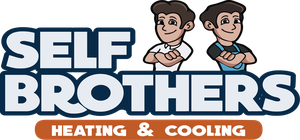Most U.S. homes are heated with either furnaces or boilers. Furnaces heat air and distribute the heated air through the house using ducts. Boilers heat water, and provide either hot water or steam for heating. Steam is distributed via pipes to steam radiators, and hot water can be distributed via baseboard radiators or radiant floor systems, or can heat air via a coil. Steam boilers operate at a higher temperature than hot water boilers, and are inherently less efficient, but high-efficiency versions of all types of furnaces and boilers are currently available.
Understanding the Efficiency Rating of Furnaces and Boilers
A central furnace or boiler's efficiency is measured by annual fuel utilization efficiency (AFUE). The Federal Trade Commission requires new furnaces or boilers to display their AFUE so consumers can compare heating efficiencies of various models. AFUE is a measure of how efficient the appliance is in converting the energy in its fuel to heat over the course of a typical year.
Specifically, AFUE is the ratio of annual heat output of the furnace or boiler compared to the total annual fossil fuel energy consumed by a furnace or boiler. An AFUE of 90% means that 90% of the energy in the fuel becomes heat for the home and the other 10% escapes up the chimney and elsewhere. AFUE doesn't include the heat losses of the duct system or piping, which can be as much as 35% of the energy for output of the furnace when ducts are located in the attic, garage, or other partially conditioned or unconditioned space.
An all-electric furnace or boiler has no flue loss through a chimney. The AFUE rating for an all-electric furnace or boiler is between 95% and 100%. The lower values are for units installed outdoors because they have greater jacket heat loss. However, despite their high efficiency, the higher cost of electricity in most parts of the country makes all-electric furnaces or boilers an uneconomic choice. If you are interested in electric heating, consider installing a heat pump system.
You can identify and compare a system's efficiency by not only its AFUE but also by its equipment features.
Old, low-efficiency heating systems:
- Natural draft that creates a flow of combustion gases
- Continuous pilot light
- Heavy heat exchanger
- 56% to 70% AFUE.
Mid-efficiency heating systems:
- Exhaust fan controls the flow of combustion air and combustion gases more precisely
- Electronic ignition (no pilot light)
- Compact size and lighter weight to reduce cycling losses
- Small-diameter flue pipe
- 80% to 83% AFUE.
High-efficiency heating systems:
- Condensing flue gases in a second heat exchanger for extra efficiency
- Sealed combustion
- 90% to 98.5% AFUE.
Retrofitting Your Furnace or Boiler
Furnaces and boilers can be retrofitted to increase their efficiency. These upgrades improve the safety and efficiency of otherwise sound, older systems. The costs of retrofits should be carefully weighed against the cost of a new boiler or furnace, especially if replacement is likely within a few years or if you wish to switch to a different system for other reasons, such as adding air conditioning. If you choose to replace your heating system, you'll have the opportunity to install equipment that incorporates the most energy-efficient heating technologies available.
Other retrofitting options that can improve a system's energy efficiency include installing programmable thermostats, upgrading ductwork in forced-air systems, and adding zone control for hot-water systems.
Replacing Your Furnace or Boiler
Although older furnace and boiler systems had efficiencies in the range of 56% to 70%, modern conventional heating systems can achieve efficiencies as high as 98.5%, converting nearly all the fuel to useful heat for your home. Energy efficiency upgrades and a new high-efficiency heating system can often cut your fuel bills and your furnace's pollution output in half. Upgrading your furnace or boiler from 56% to 90% efficiency in an average cold-climate house will save 1.5 tons of carbon dioxide emissions each year if you heat with gas, or 2.5 tons if you heat with oil.
If your furnace or boiler is old, worn out, inefficient, or significantly oversized, the simplest solution is to replace it with a modern high-efficiency model. Old coal burners that were switched over to oil or gas are prime candidates for replacement, as well as gas furnaces with pilot lights rather than electronic ignitions. Newer systems may be more efficient but are still likely to be oversized, and can often be modified to lower their operating capacity.
Before buying a new furnace or boiler or modifying your existing unit, first make every effort to improve the energy efficiency of your home, then have a heating contractor size your furnace. Energy-efficiency improvements will save money on a new furnace or boiler, because you can purchase a smaller unit. A properly sized furnace or boiler will operate most efficiently, and you'll want to choose a dependable unit and compare the warranties of each furnace or boiler you’re considering.
When shopping for high-efficiency furnaces and boilers, look for the ENERGY STAR® label. If you live in a cold climate, it usually makes sense to invest in the highest-efficiency system. In milder climates with lower annual heating costs, the extra investment required to go from 80% to 90% to 95% efficiency may be hard to justify.
Specify a sealed combustion furnace or boiler, which will bring outside air directly into the burner and exhaust flue gases (combustion products) directly to the outside, without the need for a draft hood or damper. Furnaces and boilers that are not sealed-combustion units draw heated air into the unit for combustion and then send that air up the chimney, wasting the energy that was used to heat the air. Sealed-combustion units avoid that problem and also pose no risk of introducing dangerous combustion gases into your house. In furnaces that are not sealed-combustion units, backdrafting of combustion gases can be a big problem.
High-efficiency sealed-combustion units generally produce an acidic exhaust gas that is not suitable for old, unlined chimneys, so the exhaust gas should either be vented through a new duct or the chimney should be lined to accommodate the acidic gas.
Maintaining Furnaces and Boilers
The following maintenance should be provided by a heating system professional.
All systems:
- Check the condition of your vent connection pipe and chimney. Parts of the venting system may have deteriorated over time. Chimney problems can be expensive to repair, and may help justify installing new heating equipment that won't use the existing chimney.
- Check the physical integrity of the heat exchanger. Leaky boiler heat exchangers leak water and are easy to spot. Furnace heat exchangers mix combustion gases with house air when they leak—an important safety reason to have them inspected.
- Adjust the controls on the boiler or furnace to provide optimum water and air temperature settings for both efficiency and comfort.
- If you're considering replacing or retrofitting your existing heating system, have the technician perform a combustion-efficiency test.
Forced Air Systems:
- Check the combustion chamber for cracks
- Test for carbon monoxide (CO) and remedy if found
- Adjust blower control and supply-air temperature
- Clean and oil the blower
- Remove dirt, soot, or corrosion from the furnace or boiler
- Check fuel input and flame characteristics, and adjust if necessary
- Seal connections between the furnace and main ducts.











